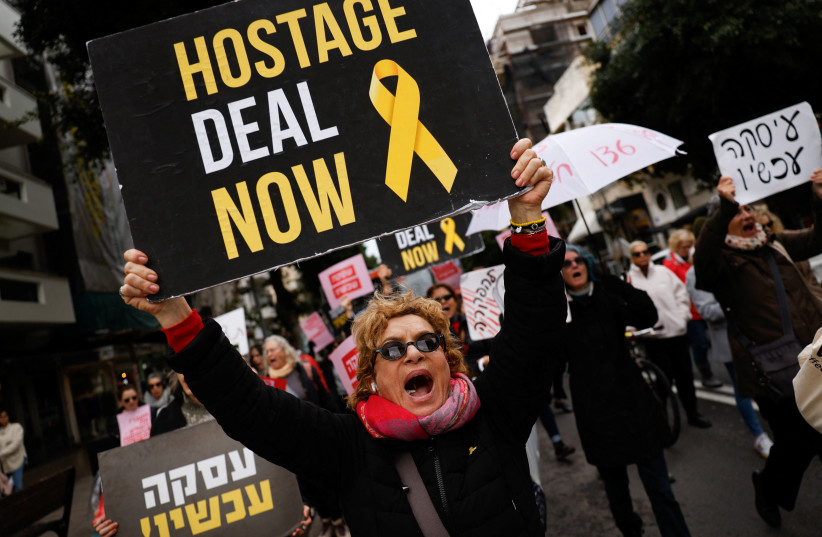It seems to me that here in Israel, we are faced with what can only be described as “Sophie’s choice on steroids.”
Challenging decisions regarding the course of the war in Gaza, all of which will undoubtedly have far-reaching, and potentially, disastrous consequences for some, must be made.
I’m one of the lucky ones: I haven’t lost any loved ones; I don’t know anyone personally who has been kidnapped; I haven’t been forced to leave my home; and none of my children is serving in Gaza, although two are in the army. Accordingly, I feel as if I’m one stage removed from the utter despair that many people, particularly the hostages’ families, are currently facing.
Decisions surrounding the hostages are probably the most difficult of all right now. Their plight keeps many of us up at night. Visions of them languishing in tunnels below Gaza, deprived of food and basic amenities, while likely suffering physical and sexual abuse, torment us greatly.
They must be saved – but at any cost? That is the question vexing the decision-makers and the nation as a whole.

Can Israel afford to save the hostages from Gaza?
Some argue, yes – at any cost. Their safe return is of paramount importance, even if it means agreeing to a permanent ceasefire and pulling out of Gaza, spelling the end of the war and handing the Hamas terrorist organization a victory.
As long as the hostages return to us safe and whole, the rest pales into insignificance.
While on the face of it, many agree with this sentiment, there are of course other factors that must be considered.
Some contend that doing a “deal with the devil” is asking for trouble. While Israel has already gone down this path, securing the release of more than 100 hostages, the deal only involved the release of low-level Palestinian criminals in return for the hostages. And the majority of the public was satisfied with the outcome.
Could the same response be expected if another deal were made, this time involving the release of thousands of convicted murderers and dangerous terrorists? Probably not. As well as asking the Israeli public to swallow the bitterest of pills, such an outcome could have significant repercussions in terms of our overall security. You only have to think back to the 2011 Gilad Schalit deal that saw the release of one of the masterminds behind October 7, Yahya Sinwar, among others.
Some also argue that every Israeli citizen would be at heightened risk of being kidnapped, not just in Israel, but anywhere in the world if another, more far-reaching hostage deal was reached. Knowing that the Israeli government would do almost anything to secure the release of its citizens, as a nation, every one of us would become hostage fodder.
This dire prospect is one of the reasons some assert that any further hostage negotiations should be off the table.
The overall security of the country is another important consideration. With Hamas in Gaza, Israel is not safe. October 7 showed us what this terror group is capable of, and their boast that they would do it again and again, given the chance, should not be taken lightly. Consequently, the war must end with their defeat, as far as possible.
THERE’S ALSO a feeling in some quarters that entering a deal that involves the return of the hostages and brings an end to the war, with Hamas still intact, would constitute a betrayal of the fallen. On the other hand, to dismiss a deal on this basis, and to fight on with no certainty of a successful outcome regarding the hostages or Hamas, might, itself constitute a betrayal.
Is it, one might ask, acceptable to honor the fallen by fighting on – resulting in more fallen?
With reports of a hostage deal gripping the nation, Prime Minister Benjamin Netanyahu addressed this sensitive issue earlier this week in a speech at the Bnei David military academy in Eli, confirming that Israel would not release “thousands of terrorists” in return for the hostages.
He also went on to assert that Israel “will not end this war with less than the achievement of all its goals. This means the elimination of Hamas, the return of all our hostages, and the promise that Gaza will no longer pose a threat to Israel.”
However, some believe that such bold statements are neither helpful nor realistic. In an ideal world, these goals would be achieved, but most here recognize that war isn’t binary, and no such promises can sensibly be made. At best, Netanyahu’s promises are wishful thinking. At worst, they are simply politically driven empty assurances.
Gadi Eisenkot, a minister in the war cabinet, whose 25-year-old son Gal was killed in December while fighting in Gaza, gave no such assurances when speaking on Channel 12’s investigative program Uvda. “The hostages will only return alive if there is a deal, linked to a significant pause in fighting,” he said.
He also opined that dramatic rescue operations like Entebbe in 1976 were unlikely because the hostages were apparently spread out, many of them in underground tunnels. Claiming hostages could be freed by means other than a deal “is to spread illusions,” he said matter-of-factly.
Ultimately, unenviable decisions have to be made by the powers that be. Whichever way you look at it, however, one thing is for sure: more tragic deaths will occur either on the battlefields of Gaza or in the tunnels below.
I do not pretend to have the answer to any of these appalling conundrums. October 7, and everything that has flowed from it, shows that there are no good answers.
The writer is a former lawyer from Manchester, England. She now lives in Israel where she works at The Jerusalem Post.
